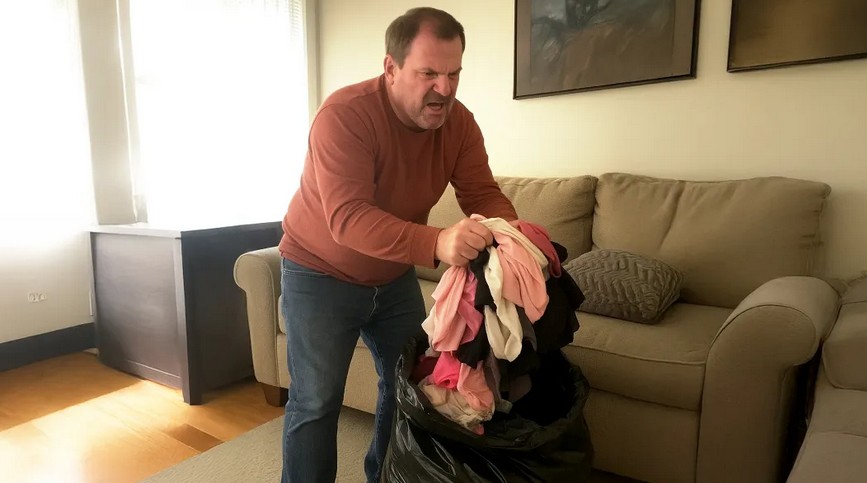When Mom Found the “Perfect” Man After Years Alone, I Thought He’d Treat Her Right — But What I Discovered After Their Wedding Made Me Step In and Teach Him a Lesson He’d Never Forget
My Stepfather Said Mom Didn’t Need Nice Clothes Anymore: After my dad passed away during my high school years—cancer, cruel and swift—life changed drastically for our family. Mom held it together for me, but deep down, I knew she was struggling with the silence and loneliness that followed. When she finally met someone new, I hoped it was a fresh start. But soon, I realized she needed saving all over again.
Stepfather Said Mom Didn’t Need Nice Clothes Anymore – Emotional Story
In the years after Dad died, I watched Mom, Stacey, cling to little things that reminded her of him—like wearing his old T-shirts and forcing polite smiles around friends while breaking down when she thought no one was listening. It was just the two of us against the world. She worked tirelessly, I focused on school, and together we managed to keep the pieces from shattering completely.

Time went on. I moved into my own place, and Mom stayed behind in our family home, living quietly—maybe too quietly. It was hard seeing her so alone, and I welcomed the day a new neighbor moved in and showed genuine interest in her life.
His name was Robert. A retired physical therapist with salt-and-pepper hair and a charming smile that somehow made old-fashioned terms like “darlin’” sound sincere. He came bearing wildflowers—not roses because, as he said, “Roses are too predictable for a woman like your mom.” He showed up with homemade soup when she was sick and sent her memes that were just the right kind of cheesy.
Robert surprised her with lunches at work, left thoughtful notes on her windshield, and once even brought me daisies, telling me, “Thanks for sharing your mom with me.” Honestly, I was relieved. Finally, someone was treating Mom with the kindness she deserved.
Nine months later, he proposed—and Mom said yes immediately. I thought maybe this time, things would be different.
But after the wedding, the change was undeniable.
The bright, lively woman who once owned bold lipstick and colorful dresses now faded into muted tones—beiges, grays, turtlenecks. Her sparkle vanished. She stopped attending weekend brunches, stopped laughing with friends, and gradually withdrew from everything she loved.
At first, I told myself maybe she was just adjusting. But the heaviness in her silence soon became impossible to ignore. One day, I asked if she was okay.
“I’m just tired,” she said softly. “Marriage takes work.”
I let it slide—until one Friday afternoon when I decided to surprise her with pecan pie from her favorite bakery.
She had moved in with Robert and given me a spare key, so I didn’t call ahead. But what I walked into shook me to my core.
Before I even saw them, I heard Robert’s voice: “These dresses? You don’t need them anymore. Who are you trying to impress now that you have me?”
My heart stopped.
I turned the corner and found him cramming her cherished dresses—the ones she wore on vacations, birthdays, even my graduation—into trash bags. Mom sat silently on the couch, staring at the floor, hands clenched in her lap, a single tear trailing down her cheek.
“What’s going on here?” I demanded.
Robert smiled as if he’d just done a favor. “Oh, nothing. Your mom said to get rid of these. Says she doesn’t fit in them anymore.”
I looked at Mom. No response. No resistance.
That was when I knew: this wasn’t her choice. It was control, wrapped in a cardigan and a smile.
I clenched my fists but forced myself to stay calm. “Wow, Robert, that’s so thoughtful of you,” I said, layering on the sarcasm with a fake smile. “You always go above and beyond, don’t you?”
He chuckled. “I just want what’s best for her.”
I nodded, sweetly: “Of course. Your devotion is truly admirable.”
He beamed, unaware of my plan forming behind my smile.

That weekend, I researched everything I could—women’s shelters, legal aid, rental listings. By Monday, I was ready.
Thursday night, I showed up with wine and compliments. “You must be exhausted caring for Mom, Rob. Why don’t I take her out for a little break? Maybe you could enjoy a quiet night to yourself.”
He happily agreed.
That little “break” turned into a weekend getaway—just Mom and me, far from Robert’s shadow.
I told her it was time to stop going back.
“But what about Robert?” she whispered, scared.
“I’m angry too, Mom,” I said firmly. “He’s been controlling you, changing you into someone you’re not. This isn’t love.”
She didn’t argue.
By Sunday night, I had signed a lease for her—two-bedroom, safe, and close to me.
That night, I packed her things while Robert was distracted and grabbed one last item: his expensive monogrammed golf bag, which I donated to a local women’s shelter for survivors starting over, with a note tucked inside:

He wanted to throw away everything that didn’t suit him. So I made sure that’s exactly what happened.
Mom lives just a few floors above me now. She bought a red trench coat last week because it makes her feel powerful. She walks every morning with a group of women who laugh loud, wear sneakers that squeak, and never apologize for taking up space.
She’s baking again, smiling again, living again—on her own terms.
We’ve started divorce proceedings, and soon she’ll be free.
One day, I ran into Robert outside the post office. He looked smaller, more defeated.
“Hey Robert,” I said casually. “How’s the house?”
He cleared his throat. “It’s fine.”
I smiled. “Mom made lemon bars yesterday. Still her favorite.”
He said nothing.
I added, “For a man who thought she didn’t need pretty clothes anymore, you seriously underestimated how stunning she looks walking away.”
No response.

Because he’d lost more than a wife—he lost control. And he never saw it coming.
When men like him meet a woman who’s been quiet only as long as she had to be, they learn the hard way.
We’re not weak.
We’re just waiting—for the moment we stop being silent.




